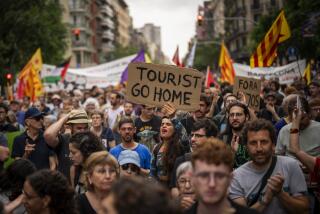South Africa Welcomes Wave of Tourists Taking in Sights : Travel: With apartheid ended, foreigners bolster nation’s economy. Game parks, Zulu villages, even impoverished townships attract visitors.
- Share via
PHINDA, South Africa — When the dozen lions strutted regally a few feet in front of the open Land Rover, Marjorie Possick got a brief case of jitters.
“How do you know they’re not going to eat us?” the American nutritionist asked her guide. Her husband, Paul, had a quick answer: “They don’t bite the hand that feeds them.”
Almost a year after apartheid ended, the hands of tourists are feeding a booming sector of South Africa’s economy. With President Nelson Mandela’s black-led government in power, hordes of foreigners are digging into their wallets to see a country long avoided by the skittish or morally conscious.
About 620,000 tourists to South Africa spent the equivalent of $1.7 billion in 1993. The numbers are not in yet for 1994, but the South African Tourism Board expects about 800,000 this year.
That compares to about 400,000 a year during most of the 1980s. The numbers began rising in 1990, the year Mandela was freed from prison to begin negotiations with the white-minority government on ending apartheid.
The Tourism Board hopes 1996 will bring 1 million people eager to sample magnificent game parks, world-class wineries, traditional Zulu villages and even impoverished townships notorious for violence and revolution.
Among the new wave are black Americans, although the government says it has no separate numbers. Graham Stewart, who runs a re-creation of an authentic 19th Century Zulu village as a tourist attraction a 90-minute drive south of Phinda, says he receives the occasional busload “seeking their roots.”
“Obviously, South Africa’s new international status is now favorable for tourism marketing,” said Ernie Heath, the Tourism Board’s deputy executive director.
Apartheid’s demise has opened South Africa to a wider world. With sanctions that punished the old regime gone, foreign companies are sniffing new markets and foreign visitors are seeking new havens.
Some will be enjoying South Africa’s return to international sports. The Rugby World Cup in May and June is expected to bring 30,000 visitors from New Zealand, Australia, England, France and other countries.
Whether the infrastructure is ready is another matter. A shortage of hotel rooms has entrepreneurs offering houses for rent at $3,400 a month, five times the normal rate. Some restaurant owners question if enough top quality food will be available.
The rugby championship is seen as a test of Cape Town’s bid to be host for the 2004 Olympics. Planners hope the room shortage can be overcome by housing guests in 36 ocean liners in the city’s scenic harbor.
Many tourists say they never would have visited South Africa without the end of white rule.
“This is the new South Africa,” said Keenan Keller, 30, a New York lawyer. “Mandela is president and we feel good about coming here. It’s still an uncertain country, but that’s part of the attraction.”
Though political violence has died down, visitors to Johannesburg confront one of the world’s highest crime rates. But apart from muggings for cameras and wallets, tourists seem to avoid the carjackings and murders reported daily.
The Possicks, a middle-age couple from New York City, built their itinerary around the country’s game parks. At the privately owned Phinda Resource Reserve 220 miles southeast of Johannesburg, they took guided drives at dawn and sunset to observe wildlife up close.
They saw a pride of lions padding nonchalantly in their path, a cheetah and four cubs taking shade under a tree, a family of giraffes nibbling treetops and seven white rhinoceros munching on grass.
Les Carlisle, Phinda’s regional development manager, believes the future of Africa’s wildlife lies in tourism. Foreign money paid to see game makes the animals an economic resource, giving the local population a reason to protect animals instead of poaching them, he said.
Phinda employs about 300 local Zulus and pays for a clinic and charcoal mill in a nearby village. Each worker is estimated to have 10 dependents. Per capita monthly income in a region dependent on subsistence farming has tripled in the last four years to nearly $350.
“Stay here, and maybe you’re saving 45 rhino,” Carlisle said.
Saving rhino does not come cheap. Phinda’s basic day rate is 1,195 rand ($340) a person in peak season. Guests fly to a grassy airstrip, sleep in air-conditioned bungalows and dine on prawns, steak or game.
But once past the air fare to South Africa, most of the country is a bargain due to the strength of major currencies against the rand.
The huge Kruger National Park features wildlife on a tent-and-backpack budget, an excellent meal with wine for two rarely exceeds 150 rand ($43), and the stunning views of the coastal Garden Route are free.
Lengthy coasts, a rugged interior and good climate offer numerous opportunities for horseback riding, hiking, snorkeling and windsurfing. South Africa’s answer to Las Vegas, the Sun City gambling resort and the Lost City luxury hotel, are a two-hour drive from Johannesburg.
“I never would have thought of coming to South Africa before,” said Alexis Adler, 38, an American taking a bus tour of the Soweto black township outside Johannesburg. “We’re the first people I know who’ve been here.”
More to Read
Sign up for The Wild
We’ll help you find the best places to hike, bike and run, as well as the perfect silent spots for meditation and yoga.
You may occasionally receive promotional content from the Los Angeles Times.






